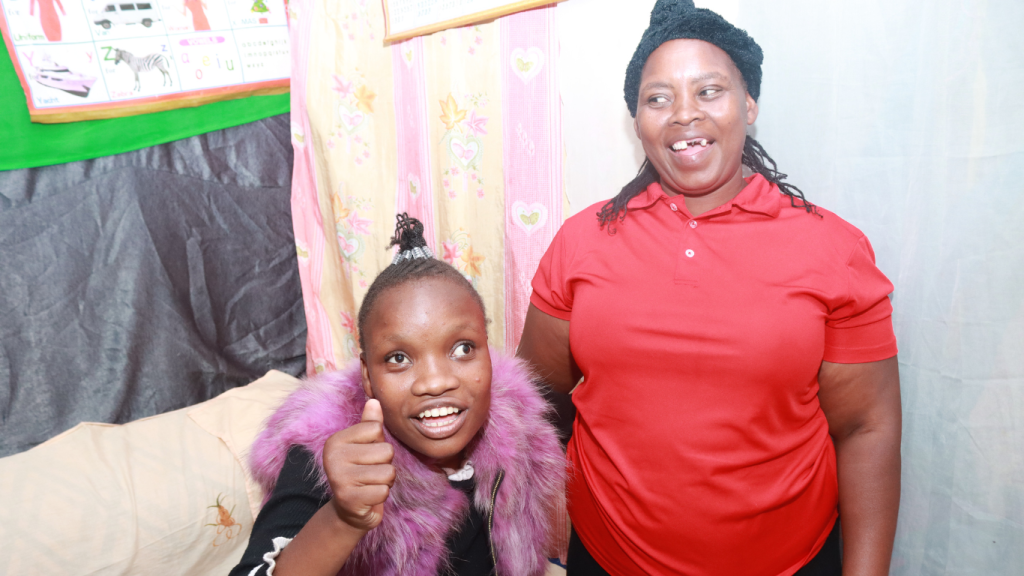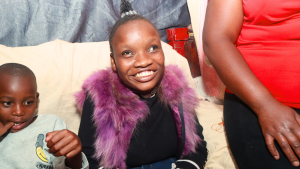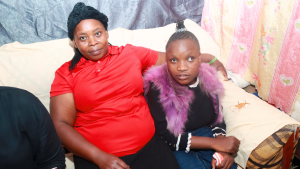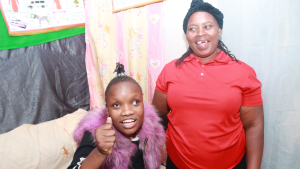Safe spaces transforming lives amidst intersecting challenges
 20 February 2025
20 February 2025

"Safe spaces for adolescent girls and young women are truly essential for our young people. These forums provide vital teachings on SRHR advocacy, menstrual hygiene, acceptance, and psychosocial support. Besides our young girls with disabilities benefitting greatly from these interactions, we the caregivers have also benefited. As a parent, I commend such initiatives by the Make Way Programme."
In Kamongo area, within the Starehe constituency of Nairobi County, lies the densely populated informal settlement of Mukuru Kwa Njenga. The neighborhood is characterized by a maze of iron sheet structures, and the environment is bustling with activities. Children play along the narrow pathways, which are only passable by foot, while women sell various items on the roadside, contributing to the lively atmosphere. Amidst these, they do not despair but rather optimistic for the greater things the future holds.
That is the residence of Agnes Mokeira, the mother to Stella Akinyi Ouma, an 18-year-old joyful girl with severe cerebral palsy and dysarthria. Stella is a member of the Mukuru Safe Space for Adolescents girls and Young Women with Disabilities.
Stella was happy to receive us and she kept on smiling at us, an indication that she had welcomed us, according to her mother.

“When she smiles at you, it means she has liked you and welcomed you home,” the mother said.
Stella who is a learner at Nyabondo special school acquired her disability at birth, and the mother realized this when she was 5 months old after medical assessments. She hears and can respond in action.
Being the eldest child out of 3 siblings, her mother values her so much, and even her younger siblings respect and love her.
“I had never heard of a safe space before but from the explanation I got from a friend, I was willing to give it a try. The moment I went with my daughter to the safe space was the first day I got relieved and realized that truly there is a space for everyone in this society, that day I truly accepted myself and I felt at home after meeting other parents with girls like mine.” Agnes narrated.
The safe space is not only valuable to the young girls with disabilities but also to their caregivers who accompany them for the sessions.
“Before, I never accepted myself and would bow to the social prejudice from family, friends, and society. I was ashamed to walk within the estates and was unable to make friends because people viewed me as a bad omen for having a child with a disability. However, everything changed when I accompanied my daughter to join the Make Way Programme’s Safe Space in Mukuru, where I acquired valuable knowledge that has boosted myself esteem as a mother,” narrated Agnes.
Agnes shared that the safe space also welcomes caregivers to attend due to the full support required by their daughters and as a caregiver of a child with a disability, besides being unemployed with no income-generating activity, she faces numerous intersecting challenges. This is especially true for Stella; whose security and general well-being depend entirely on her. She longed for a place where she could learn more about caring for her daughter.

At the safe space, they are taught about disability types, taking care of young girls with disabilities during menses, making reusable sanitary towels and even sexual and reproductive health and rights aspects as a whole. They can keep track of their daughter’s menstrual cycles, and teach them the activities of daily living.
“Stella enjoys bathing and takes great care in maintaining her hygiene. I have learned how to support her during her menstrual periods and understand the importance of taking her for contraceptive services.
As caregivers who bear the challenges associated with disabilities, they are empowered to form a parent support group among themselves, enabling them to provide psychosocial support to one another.
“At least I have people who can check on Stella and me, especially when I take her to the hospital or when she is unwell. I would miss taking her to the safe space, but other parents from there always inquire about our well-being. Some even visit us at home,” she said happily, breathing a sigh of relief.
“Stella has mastered our way to the safe space and whenever I prepare her for the day, she gets so excited because through the safe space she is able to bond with other young girls with disabilities, she even has a best friend from the safe space. “she added.
Their participation in the safe space has significantly benefited their community as they consistently share the teachings and skills acquired from the safe space with their adolescent children and also educate other parents on how to properly care for young girls with disabilities.
“The other day one of our neighbors enquired where I always take Stella to and I explained to her about the safe space and what I learn there as a mother, she was interested to learn more especially on how they can take care of their young girls here in the slums,” she emphasized.

Agnes says that they will continue with the safe space session even if the programme phases out for its benefits to the women and girls in that community and only recommends support with teaching illustrators for children with disabilities for easy understanding of topics taught.
“Safe spaces for adolescent girls and young women are truly essential for our young people. These forums provide vital teachings on SRHR advocacy, menstrual hygiene, acceptance, and psychosocial support. Besides our young girls with disabilities benefitting greatly from these interactions, we the caregivers have also benefited. As a parent, I commend such initiatives by the Make Way Programme,” she concluded.
Read more about safe spaces on realization to SRHR service deliver on the website of Cheshire Disability Services.
Read the article ‘Safe spaces for adolescent and young women with disabilities: An avenue for disability inclusion and SRHR advocacy‘



